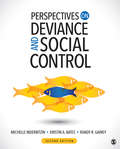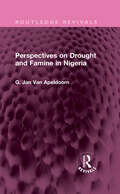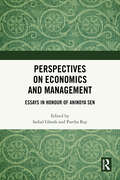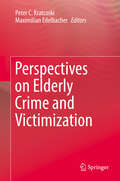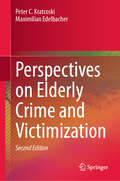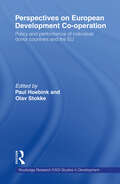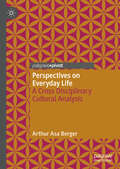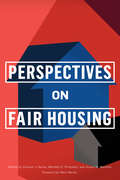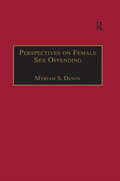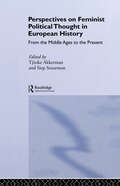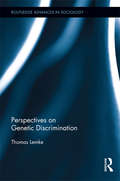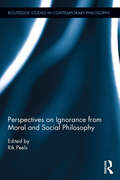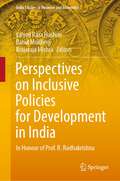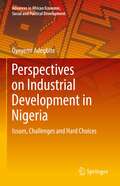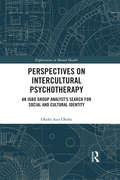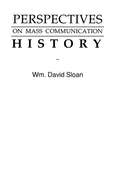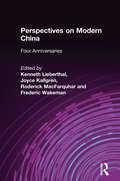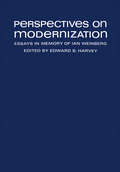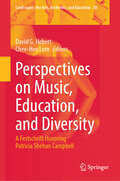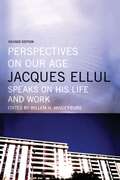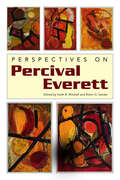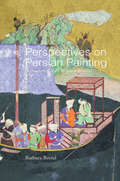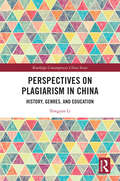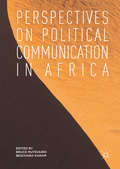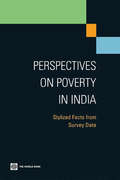- Table View
- List View
Perspectives on Deviance and Social Control
by Randy R. Gainey Michelle L. Inderbitzin Kristin A. BatesPerspectives on Deviance and Social Control provides a sociological examination of deviance and social control in society. Derived from the same author team’s successful text/reader version, this concise and student-friendly resource uses sociological theories to illuminate a variety of issues related to deviant behavior and societal reactions to deviance. The authors briefly explain the development of major sociological theoretical perspectives and use current research and examples to demonstrate how those theories are used to think about and study the causes of deviant behavior and the reactions to it. Focusing on the application—rather than just the understanding—of theory, the Second Edition offers a practical and fascinating exploration of deviance in our society.
Perspectives on Drought and Famine in Nigeria (Routledge Revivals)
by G. Jan Van ApeldoornOriginally published in 1981, this book provided the first concise and integrated account of the Nigerian crisis and uncovered the basic cause of the increasing vulnerability of the Nigerian rural poor during the 1970s to the effects of drought, in order to show the lessons of the crisis and how they could be translated into medium-term action. The author argued that an analysis of the causes and impact of the drought and famine disaster of the seventies could offer useful clues to the policy orientations necessary to avert a protracted food crisis in the region
Perspectives on Economics and Management: Essays in Honour of Anindya Sen
by Partha RayThe world of economics and management is being reshaped in more ways than one including rapid advancements in technology and business practices. This book weaves together a diverse set of issues such as consumption patterns, wealth disparities and the management, behaviour and financial health of businesses and consumers to analyse the effectiveness of economic and business strategies. Rapid technological advancements along with the need for cost-effectiveness and convenience are making service providers embrace technology as a partner rather than a tool in their economic journey. Relatedly, traditional management philosophy is coming under a scanner, with an increasing emphasis on holistic development of the organization, rather than a top-down approach, as has been the case in the past. Understanding major developments in economic and financial policymaking has perennially been a key concern of public policy, shaped by recent global and related developments, this has necessitated a relook at these issues, couched in a cross-cutting perspective. Viewed from this standpoint, the present volume, written to honour the rich academic work of the eminent economist Professor Anindya Sen intersects this triad of economics, finance and public policy that are integral to policy thinking and its formulation. The smorgasbord of research ideas, involving both theoretical analysis and empirical evidence, presented in this volume, provides useful perspectives on the drivers that are continually reshaping the dynamism in the world around us and, in the process, integrates a multidisciplinary perspective of focusing on several pertinent policy challenges.This book will be useful to researchers and students of economics, finance and public policy, economic theorists, microeconomics, and even to those with a broader canvass such as researchers in macroeconomics, international economics, business, management and marketing.
Perspectives on Elderly Crime and Victimization
by Peter C. Kratcoski Maximilian EdelbacherThis textbook focuses on the criminality and victimization of the elderly population. It provides a global perspective on the extent of the elderly crime and victimization, with international comparisons for addressing the problem. It explores the extent and types of crimes committed by the elderly, the characteristics of older criminals, and the responses of the criminal justice system (including prisons and institutions) to elderly criminals, including: diversion programs, community-based treatment programs, and special programs including health & mental health care services for older prisoners. The second part of the book covers victimization of the elderly. Research findings show that certain crimes including fraud, theft, and certain types of financial crimes disproportionately affect older people, and these types of crimes are growing in prevalence. This work explores the characteristics of older victims and the types of crimes that affect them. Finally, the book presents comparative international research on approaches to crime prevention, education, and legislation to address the victimization of the elderly. This work will be of interest to students in criminology and criminal justice, as well as related fields such as sociology, and gerontology.
Perspectives on Elderly Crime and Victimization
by Peter C. Kratcoski Maximilian EdelbacherThe updated second edition of this textbook focuses on understanding and addressing the criminality and victimization experienced by the elderly population globally. It offers insights into the prevalence of elderly crime and victimization through international comparisons and explores effective strategies to tackle this issue. The book covers a wide range of topics, including the types of crimes committed by the elderly, the characteristics of older offenders, and the responses of the criminal justice system, such as diversion programs and community-based treatments. It also delves into specialized programs providing health and mental health services for older prisoners. Furthermore, the new edition expands on processing and rehabilitation approaches for elderly offenders, along with services aimed at preventing, protecting, and caring for elderly victims. It also includes comparative international research on crime prevention methods and legislative measures, making it a valuable resource for students in criminology, criminal justice, sociology, and gerontology.
Perspectives on European Development Cooperation: Policy and Performance of Individual Donor Countries and the EU (Routledge Research EADI Studies in Development)
by Paul Hoebink Olav StokkeEvents of the past twenty years, including the Cold War and the War on Terror, have meant that the environments of international development co-operation have changed extensively, with dramatic consequences for development policies and North-South relations in general. Perspectives on European Development Cooperation takes stock of such changes, describing and analyzing the new European development agenda, including the role of the European Union. Essays by prominent authorities in the field examine the development policies of individual donor countries and focus on the principles and objectives governing aid strategies and the performances of these policies. This book will be of interest to students of development studies and those involved in determining development policy.
Perspectives on Everyday Life: A Cross Disciplinary Cultural Analysis
by Arthur Asa BergerPerspectives on Everyday Life: A Cross Disciplinary Cultural Analysis makes the argument for studying everyday life through a combination of introductory theoretical approaches and a grouping of applications to specific aspects of American culture. The first part of the book addresses the idea of everyday life as considered by distinguished thinkers who have written books about everyday life, such as Sigmund Freud, Fernand Braudel, Henri Lefebvre, Michel de Certeau, and others. The second part of the book uses theories dealt with in the first part of the book to explore objects—such as suitcases, alarm clocks, milk, pacifiers, pressure cookers, smart speakers, and super-glue—and their part in the various rituals of everyday life in America, revealing their hidden meanings.
Perspectives on Fair Housing (The City in the Twenty-First Century)
by Vincent J. Reina, Wendell E. Pritchett and Susan M. WachterTitle VIII of the Civil Rights Act of 1968, known as the Fair Housing Act, prohibited discrimination in the sale, rent, and financing of housing based on race, religion, and national origin. However, manifold historical and contemporary forces, driven by both governmental and private actors, have segregated these protected classes by denying them access to homeownership or housing options in high-performing neighborhoods. Perspectives on Fair Housing argues that meaningful government intervention continues to be required in order to achieve a housing market in which a person's background does not arbitrarily restrict access.The essays in this volume address how residential segregation did not emerge naturally from minority preference but rather how it was forced through legal, economic, social, and even violent measures. Contributors examine racial land use and zoning practices in the early 1900s in cities like Atlanta, Richmond, and Baltimore; the exclusionary effects of single-family zoning and its entanglement with racially motivated barriers to obtaining credit; and the continuing impact of mid-century "redlining" policies and practices on public and private investment levels in neighborhoods across American cities today. Perspectives on Fair Housing demonstrates that discrimination in the housing market results in unequal minority households that, in aggregate, diminish economic prosperity across the country.Amended several times to expand the protected classes to include gender, families with children, and people with disabilities, the FHA's power relies entirely on its consistent enforcement and on programs that further its goals. Perspectives on Fair Housing provides historical, sociological, economic, and legal perspectives on the critical and continuing problem of housing discrimination and offers a review of the tools that, if appropriately supported, can promote racial and economic equity in America.Contributors: Francesca Russello Ammon, Raphael Bostic, Devin Michelle Bunten, Camille Zubrinsky Charles, Nestor M. Davidson, Amy Hillier, Marc H. Morial, Eduardo M. Peñalver, Wendell E. Pritchett, Rand Quinn, Vincent J. Reina, Akira Drake Rodriguez, Justin P. Steil, Susan M. Wachter.
Perspectives on Female Sex Offending: A Culture of Denial (Welfare and Society)
by Myriam S. DenovThe issue of child sexual abuse has gained widespread attention over the last three decades, but minimal attention has been paid to sexual abuse by women. Victims of female sex offenders have been virtually ignored or neglected from serious study. Consequently we have little knowledge of the experience of victims or of professional perspectives on female sex offending. Myriam Denov fills these critical gaps in the literature by examining the life histories and experiences of both male and female victims of female sex offenders, and by investigating the impact and consequences of the sexual abuse. She also explores professional responses to female sex offending and the ways in which police officers and psychiatrists have understood, portrayed and managed such cases. In addition to filling the substantial empirical void that surrounds the issue, the book contributes to policy and practice issues relating to victims and to the training of different professional groups involved in child sex abuse.
Perspectives on Feminist Political Thought in European History: From the Middle Ages to the Present
by Tjitske Akkerman and Siep StuurmanSpanning six centuries of political thought in European history, this book puts the ideas of thinkers from Christine de Pizan to Simone de Beauvoir in the broader contexts of their time. This intriguing collection of essays shows that feminism is not a varient of modern radical discourse but a mode of analysing the issues of authority, power and virtue that have been at the heart of European political thought from the middle ages.
Perspectives on Genetic Discrimination (Routledge Advances in Sociology #100)
by Thomas LemkeOver the past 15 years, a series of empirical studies in different countries have shown that our increasing genetic knowledge leads to new forms of exclusion, disadvantaging and stigmatization. The spectrum of this "genetic discrimination" ranges from disadvantages at work, via problems with insurance policies, to difficulties with adoption agencies. The empirical studies on the problem of genetic discrimination have not gone unnoticed. Since the beginning of the 1990s, a series of legislative initiatives and statements, both on the national level and on the part of international and supranational organizations and commissions, have been put forward as ways of protecting people from genetic discrimination. This is the first book to critically evaluate the empirical evidence and the theoretical usefulness of the concept of "genetic discrimination." It discusses the advantages and limitations of adopting the concept, and offers a more complex account distinguishing between several dimensions and forms of genetic discrimination.
Perspectives on Ignorance from Moral and Social Philosophy (Routledge Studies in Contemporary Philosophy)
by Rik PeelsThis edited collection focuses on the moral and social dimensions of ignorance—an undertheorized category in analytic philosophy. Contributors address such issues as the relation between ignorance and deception, ignorance as a moral excuse, ignorance as a legal excuse, and the relation between ignorance and moral character. In the moral realm, ignorance is sometimes considered as an excuse; some specific kind of ignorance seems to be implied by a moral character; and ignorance is closely related to moral risk. Ignorance has certain social dimensions as well: it has been claimed to be the engine of science; it seems to be entailed by privacy and secrecy; and it is widely thought to constitute a legal excuse in certain circumstances. Together, these contributions provide a sustained inquiry into the nature of ignorance and the pivotal role it plays in the moral and social domains.
Perspectives on Inclusive Policies for Development in India: In Honour of Prof. R. Radhakrishna (India Studies in Business and Economics)
by Rahul Mukherji Saiyed Raza Hashim Brajaraja MishraThis book presents perspectives by eminent economists, social scientists and policy makers, exploring in depth the post-reform developments in India, including issues pertaining to growth and equity, issues which have been at the core of life-time work of Prof. R. Radhakrishna. The book brings out how some public policy instruments created to promote growth have turned out to be regressive, promoting inequalities and creating a highly asymmetric federalism in India. It examines the efficacy of fiscal and monetary reforms and also emphasises the need for strengthening the institutions of governance, particularly judiciary and police, in order to boost investors’ confidence. It presents exercises in econometric modelling for explaining factors in growth and vetting policies, and explores the issue of governance and institutions. The book provides insights into the working of an emerging economy and a large democracy which has to strive for public acceptability of the tensions of its negotiations between equity and growth. With its depth of academic excellence and breadth of topics covered, it is a ‘must read’ for researchers, policy makers, industry watchers, think tanks, and NGOs.
Perspectives on Industrial Development in Nigeria: Issues, Challenges and Hard Choices (Advances in African Economic, Social and Political Development)
by Oyeyemi AdegbiteThis book constitutes a critical review of Nigeria’s attempts to achieve rapid industrial development since independence from Britain in 1960. It details the issues, challenges, and hard choices confronted by Nigerian political leadership and highlights the reasons why the country ultimately failed to achieve industrial take-off in spite of its abundant human and material resources. Chapters take a retrospective look at government industrial development policies and programs, including the steel industry, agro-allied and forest-based industries, and the industrial estate development program. The book also discusses tariff and trade policies, incentives and disincentives to foreign direct investment (FDI) in the manufacturing sector, and small and medium enterprise (SME) development. The book concludes with a look at the recent drive towards regional integration as well as the potential impact of the Economic Partnership Agreement (EPA) between the European Union and sixteen countries of West Africa. Providing an exhaustive history of Nigeria’s economic and industrial development, this volume will be of interest to researchers and students of African economics, development studies, and industrial organization, as well as policy makers in both the public and private sectors.
Perspectives on Intercultural Psychotherapy: An Igbo Group Analyst’s Search for Social and Cultural Identity (Explorations in Mental Health)
by Okeke Azu-OkekeIn Perspectives on Intercultural Psychotherapy, Okeke Azu-Okeke explores cultural identity by drawing on his own experience as the first and only Black trainee in an Institute for Group Analysis in London and the impact this has had on his work as a lecturer and supervisor, as well as research from his group analysis sessions over many years to contribute a deeper awareness of the serious aspects of colonialism. Drawing from the perspective of an Igbo man of the older generation who grew up in two conflicting cultures, the traditional Igbo culture of Nigeria and that of the British colonialists, Okeke provides a thorough study of how cultural identity can influence research and practice in whatever form it takes: the academic, the theoretical, the economic and the psychological. The book discusses how ignoring deeply held social and spiritual values can alienate many trainees and potential clients from participating in the professions of psychotherapy and counselling. It also reflects on the author’s research into traditional Igbo methods of healing and compares these with Western models, especially of group analysis, and discusses how mutual learning can be achieved. This book will be of great interest to counsellors and psychotherapists; arts therapists; sociologists and anthropologists; policy makers engaged in health and social care policies; practitioners of alternative medicine; social workers and mental health workers at all levels.
Perspectives on Mass Communication History (Routledge Communication Series)
by Wm. David SloanThis unique volume is based on the philosophy that the teaching of history should emphasize critical thinking and attempt to involve the student intellectually, rather than simply provide names, dates, and places to memorize. The book approaches history not as a cut-and-dried recitation of a collection of facts but as multifaceted discipline. In examining the various perspectives historians have provided, the author brings a vitality to the study of history that students normally do not gain. The text is comprised of 24 historiographical essays, each of which discusses the major interpretations of a significant topic in mass communication history. Students are challenged to evaluate each approach critically and to develop their own explanations. As a textbook designed specifically for use in graduate level communication history courses, it should serve as a stimulating pedagogical tool.
Perspectives on Modern China: Four Anniversaries (Studies On Modern China)
by Frederic Wakeman Kenneth Lieberthal Roderick MacFarquhar Joyce KallgrenThe conveners (the editors of this book) of the September 1989 Four Anniversaries China Conference in Annapolis, asked the contributors to look back from that point in time to consider four major events in modern Chinese history in the perspective of the rapid changes that were shaping the Chinese society, economy, polity, and sense of place in the world in the 1980s, a time when China was making rapid strides toward becoming more integrated with the outside world. With contributions by distinguished scholars in the field, the four anniversaries considered are the High Qing, the May Fourth Movement, forty years of communism in China, and ten years of the Deng era.
Perspectives on Modernization: Essays in Memory of Ian Weinberg
by Edward HarveyPerspectives on Modernization is published in memory of Ian Weinberg, a sociologist of brilliant promise who died at the age of thirty. It consists of essays by his colleagues, students, and teachers which reflect upon and carry further Ian Weinberg's major scholarly concerns – the processes of industrialization and modernization of societies. The book begins with an essay by Ian Weinberg which was presented at the annual meeting of the American Sociological Association, 1968. It is followed by a paper of wide scope and interest, Wilbert E. Moore's 'Normative Conflict in Stages of Cultural Change.' Noting that the study of rapid social change can no longer be confined to the so-called modernizing countries, Moore argues that comparable normative conflicts occur at comparable stages of cultural change. Rainer C. Baum and Charles Tilly are concerned with the serious gaps in the theory of modernization and politics. Baum is specifically concerned with developing a political analogue to the theory of economic development; Tilly concentrates on a longitudinal study of the relationship between modernization and collective political conflicts. S.D. Clark writes of patterns of urban growth, looking at two exceptions to the well-studied outward movement of immigrants in Canadian cities. Edward Shorter studies the modernization of sexual attitudes by analysing illegitimacy. The last three papers approach modernization through economic changes and development: H. Nishio analyses the relationships between political control and economic development in Japan over two centuries; Stanely R. Barrett studies the transition of the economy in a Nigerian utopian community from communalism to partial private enterprise; and L.R. Marsden, E.B. Harvey, and J. Bulcock explore the relationship of literacy and economic development in thirty-nine African countries. The volume includes an introduction by the editor and an outline of Ian Weinberg's short but brilliant career. These essays are, like the work of the man they seek to honour, wide ranging and intellectually provocative in their approach to a complex question. The volume is a fitting tribute to both the man and the spirit of intellectual vitality to which he was committed.
Perspectives on Music, Education, and Diversity: A Festschrift Honoring Patricia Shehan Campbell (Landscapes: the Arts, Aesthetics, and Education #38)
by Chee-Hoo Lum David G. HebertThis book is a Festschrift in celebration of Patricia Shehan Campbell&’s impact for more than six decades as an eminent teacher-educator, musician and researcher in the fields of music education and ethnomusicology. Campbell&’s oeuvre of scholarly work is wide-ranging, spanning practical resources for music teachers to facilitate the teaching and learning of different musical cultures of the world, to diverse perspectives on the musical cultures of children, to the emblematic approach of World Music Pedagogy fleshed out in the Global Music Series with Oxford University Press, the Routledge World Music Pedagogy Series and her educational work with Smithsonian Folkways Recordings, alongside her extensive work with ethnomusicologists and community musicians and scholars across the world. Notable scholars from the fields of music education, ethnomusicology and community music, including Campbell&’s doctoral graduates and colleagues from across recent decades, are contributors in this Festschrift to reflect upon her scholarly work and critically dialogue on several topics: perceptions of diversity in school music and children&’s musical cultures, applied ethnomusicology, music education and its relation with the multicultural and social justice, pedagogical approaches towards cultural diversity in music and bridging communities and culture bearers.
Perspectives on Our Age: Jacques Ellul Speaks on his Life and Work
by Jacques EllulOriginally broadcast on CBC Radio's Ideas as a series of interviews, Jacques Ellul's first-person approach here makes his ideas accessible to readers looking for new ways of understanding our society, and also gives unique new insight into Ellul's life, his work, and the origins and development of his beliefs and theories. Jacques Ellul, historian, theologian, and sociologist, was one of the foremost and widely known contemporary critics of modern technological society.
Perspectives on Percival Everett (Margaret Walker Alexander Series in African American Studies)
by Keith B. MitchellPercival Everett (b. 1956) writes novels, short stories, poetry, and essays and is one of the most prolific, acclaimed, yet underexamined African American authors working today. Although to date Everett has published eighteen novels, three collections of short fiction, three poetry collections, and one children's book, his work has not garnered the critical attention that it deserves. Perhaps one of the most vexing problems scholars have had in trying to situate Everett's work is that they have found it difficult to place him and his work within a prescribed African American literary tradition. Because he happens to be African American, critics have expectations of so-called authentic African American fiction; however, his work often thwarts these expectations. In Perspectives on Percival Everett, scholars engage all of his creative production. On the one hand, Everett is an African American novelist. On the other hand, he pursues subject matters that seemingly have little to do with African American culture. The operative word here is “seemingly;” for as these essays demonstrate, Everett's works falls well within as well as outside of what most critics would deem the African American literary tradition. These essays examine issues of identity, authenticity, and semiotics, in addition to postmodernism and African American and American literary traditions—issues essential to understanding his aesthetic and political concerns.
Perspectives on Persian Painting: Illustrations to Amir Khusrau's Khamsah
by Dr Barbara BrendThis is a detailed study of the illustrations to Amir Khusrau's Khamsah, in which twenty discourses are followed by a brief parable, and four romances. Amir Khusrau (1253-1325) lived the greater part of adventurous life in Delhi; he composed in Persian, and also in Hindi. From the point of view of manuscript illustration, his most important work is his Khamsah (Quintet'). Khusrau's position as a link between cultures of Persia and India means that the early illustrated copies of the Khamsah have a particular interest. The first extant exemplar is from the Persian area in the late 14th century, but a case can be made that work was probably illustrated earlier in India.
Perspectives on Plagiarism in China: History, Genres, and Education (ISSN)
by Yongyan LiThis book examines the issue of plagiarism in the Chinese context of history and education, both in classical and contemporary times.In view of the effort on a global scale to fight against plagiarism and consolidating anti-plagiarism education, this book examines how plagiarism is conceptualized and addressed in the Confucian Heritage Culture society of China. Employing qualitative content analysis, genre analysis, and discourse analysis to examine Chinesemedium textual materials of different kinds, this book offers new perspectives on the question of plagiarism in China. These textual materials include classic and ancient Chinese books, modern newspapers in China (1840–1949), academic literature, correspondence texts on plagiarism cases, and textbooks published in China on Chinese and English academic writing.Inspiring future research and educational initiatives aimed at addressing the problem of plagiarism in the contemporary world, this book will appeal to students and scholars of education, Chinese history, and Asian studies.
Perspectives on Political Communication in Africa
by Bruce Mutsvairo Beschara KaramThis edited collection is a cutting-edge volume that reframes political communication from an African perspective. Focusing on sub-Saharan Africa and occasionally drawing comparisons with other regions of the world, this book critically addresses the development of the field focusing on the current opportunities and challenges within the African context. By using a wide variety of case studies that include Mozambique, Zambia, Rwanda, Zimbabwe, Ghana, Kenya, Uganda, South Africa, Ivory Coast and Nigeria, the collection gives space to previously understudied regions of sub-Saharan Africa and challenges the over-reliance of western scholarship on political communication on the continent.
Perspectives on Poverty in India
by World Bank StaffThe book examines India's experience with poverty reduction in a period of rapid economic growth. Marshalling evidence from multiple sources of survey data and drawing on new methods, the book asks how India's structural transformation - from rural to urban, and from agriculture to nonfarm sectors - is impacting poverty. Our analysis suggests that since the early 1990s, urban growth has emerged as a much more important driver of poverty reduction than in the past. We focus in particular on the role of small and medium size conurbations in India, both as the urban sub-sector in which urban poverty is overwhelmingly concentrated, and as a sub-sector that could potentially stimulate rural-based poverty reduction. Second, in rural areas, we focus on the nature of intersectoral transformation out of agriculture into the nonfarm economy. Stagnation in agriculture has been accompanied by dynamism in the nonfarm sector, but there is much debate about whether the growth seen has been a symptom of agrarian distress or a source of poverty reduction. Finally, alongside the accelerating economic growth and the highly visible transformation that is occurring in India's major cities, inequality is on the rise. This is raising concern that economic growth in India has by-passed significant segments of the population. The third theme on social exclusion asks if, despite the dramatic growth, historically grounded inequalities along lines of caste, tribe and gender have persisted. This book would be of interest for policymakers, researchers, non-governmental organizations, and international agencies-from India and abroad--who wish to know more about India's experience of the last two decades in reducing poverty.
